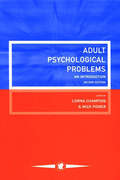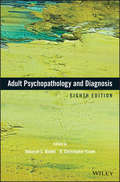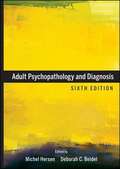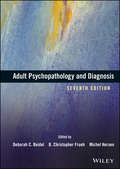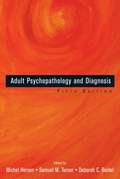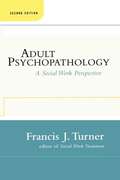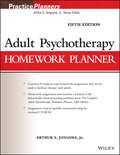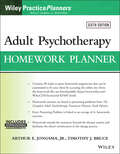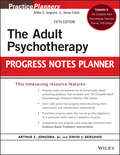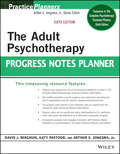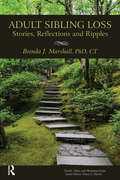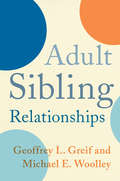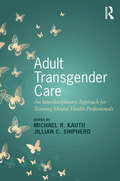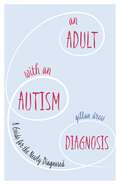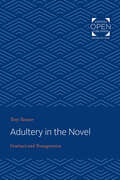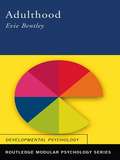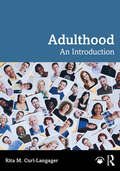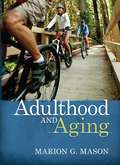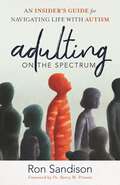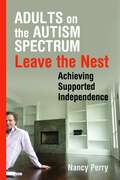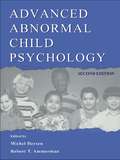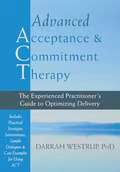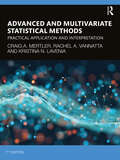- Table View
- List View
Adult Psychological Problems: An Introduction (Contemporary Psychology Ser. #Vol. 5)
by Michael Power Lorna ChampionFirst published in 2000. Routledge is an imprint of Taylor & Francis, an informa company.
Adult Psychopathology and Diagnosis
by Deborah C. Beidel B. Christopher FruehThe definitive resource for psychological diagnosis, updated with the latest research Adult Psychopathology and Diagnosis offers comprehensive coverage of psychological disorders and presents a balanced integration of empirical data and diagnostic criteria to aid in understanding diagnosis and psychopathology. Designed to support students of clinical psychology, counseling, nursing, and social work, this invaluable resource merges overviews, case studies, and examination of individual disorders in an accessible format that facilitates easy reference. Broad-reaching issues such as interviewing and cross cultural considerations are discussed in detail for their effect on the clinical presentation of every disorder and case studies illustrate how diagnoses are reached and applied in real-world clinical settings. Updated to reflect the latest advances in research, this new 8th Edition includes new coverage of personality disorders, a new chapter on the Research Diagnostic Criteria (RDOC), new authors for a number of the chapters, and contributions by leaders in the field to provide students with exceptional insight into psychopathology and diagnosis. Get up to date on the latest research based on DSM-5 categorization Easily locate and retain information with a proven chapter structure Examine a new alternative DSM-5 model for personality disorders Include cross-cultural considerations throughout investigation and diagnosis In clarifying DSM-5 classification and diagnostic guidelines while integrating leading-edge research with a case study approach, this book provides the most complete, most up-to-date reference for graduate students and practitioners alike. Thorough coverage of essential topics such as neurological foundations, dual diagnoses, eating disorders, anxiety, gender issues and more provides both theoretical insight as well as practical understanding, making Adult Psychopathology and Diagnosis once again a top resource for the field.
Adult Psychopathology and Diagnosis
by Deborah C. Beidel Michel HersenThe most up-to-date coverage on adult psychopathologyNow in its sixth edition, Adult Psychopathology and Diagnosis offers comprehensive coverage of the major psychological disorders and presents a balanced integration of empirical data and diagnostic criteria to demonstrate the basis for individual diagnoses. The accessible format, overview chapters on broader issues--such as interviewing--that affect all diagnoses, and case study approach provide the ideal support for students to examine and understand how diagnoses are reached and applied.Updated to reflect the latest advancements in psychopathology, this edition offers contributions by internationally renowned leaders in the field, thirty percent of whom are new to this edition. Coverage is featured of essential topics, including:Neurobiological foundations of disordersThe problem of dual diagnosesExpanded coverage of anxiety and gender issuesEating disordersOverview chapter on interviewingMental disorders as discrete clinical conditions with dimensional characteristicsEncompassing the most current research in the field, Adult Psychopathology and Diagnosis, Sixth Edition provides a thorough introduction to the principles of the DSM-IV-TR classification system and its application in clinical practice, including dimensional and categorical classifications.
Adult Psychopathology and Diagnosis
by B. Christopher Frueh Michel Hersen Deborah C. BeidelProven Classic Updated to Reflect the DSM-5The accessible format, overview chapters on broader issues--such as interviewing--that affect all diagnoses, and case study approach provide the ideal support for students to examine and understand how diagnoses are reached and applied.Updated to reflect the latest neurobiological advancements in psychopathology, this edition follows the same proven chapter structure for the disorder chapters of previous editions to facilitate readers' understanding and learning. Updates include topics such as:The new Schizophrenic Spectrum designation and other psychotic disordersThe revised approach to eating disordersTwo new chapters reflect the unsettled nature of the DSM-5 for academics and clinicians alike: Chapter 21: Conditions for Further Study and Chapter 22: Alternative DSM-5 Model for Personality Disorders.Encompassing the most current research in the field, Adult Psychopathology and Diagnosis, Seventh Edition provides a thorough introduction to our current conceptualization of psychopathology and its application in clinical practice, including dimensional and categorical classifications.
Adult Psychopathology and Diagnosis
by Michel Hersen Deborah C. Beidel Samuel M. TurnerThe most up-to-date coverage on adult psychopathologyAdult Psychopathology and Diagnosis, Fifth Edition offers comprehensive coverage of the major psychological disorders and presents a balanced integration of empirical data and diagnostic criteria to demonstrate the basis for individual diagnoses. The accessible format and case study approach provide the opportunity to understand how diagnoses are reached.Updated to reflect the rapid developments in the field of psychopathology, this Fifth Edition encompasses the most current research in the field including:A thorough introduction to the principles of the DSM-IV-TR classification system and its application in clinical practiceThe biological and neurological foundations of disorders and the implications of psychopharmacology in treatmentIllustrative case material as well as clinical discussions addressing specific disorders, diagnostic criteria, major theories of etiology, and issues of assessment and measurementCoverage of the major diagnostic entities and problems seen in daily clinical work by those in hospitals, clinics, and private practiceA new chapter on race and ethnicity by renowned expert Stanley Sue
Adult Psychopathology and Diagnosis (5th ed.)
by Michel Hersen Samuel Epes Turner Deborah C. BeidelAdult Psychopathology and Diagnosis, Fifth Edition offers comprehensive coverage of the major psychological disorders and presents a balanced integration of empirical data and diagnostic criteria to demonstrate the basis for individual diagnoses.
Adult Psychopathology, Second Edition
by Francis J. TurnerThe most comprehensive textbook for students in advanced social work and mental health courses is now completely revised and updated for a new generation When Adult Psychopathology: A Social Work Perspective was first published in 1984, this pioneering text was the first to conceptualize and organize theory and practice about the treatment of the mentally ill within their families and communities from a social work perspective. Now, in response to new developments in theory and research, as well as changes in service delivery within the field, the second edition contains updated and accessible information on how mental illnesses develop and how they can be treated within a social work framework that recognizes the importance of family, economics, and culture as well as biochemical and psychodynamic factors. Each chapter is written by the leading social work authority on that subject and includes practical, in-depth discussion of state-of-the-art technologies, treatments, and research. The book encompasses the broad spectrum of topics that social workers need to understand, including personality, adjustment, schizophrenia, suicide, anxiety states, phobias, neurological disorders, psychosexual disorders, drug and alcohol addiction, eating disorders, and others. Adult Psychopathology, Second Edition is essential for both M.S.W. and Ph.D. social work students and, as the authoritative, unequaled reference book, will aid clinicians in making more precise diagnoses in their daily work.
Adult Psychotherapy Homework Planner
by Arthur E. Jongsma Jr.New and updated assignments and exercises to meet the changing needs of mental health professionalsThe Adult Psychotherapy Homework Planner, Fifth Edition provides you with an array of ready-to-use, between-session assignments designed to fit virtually every therapeutic mode. This easy-to-use sourcebook features:92 ready-to-copy exercises covering the most common issues encountered by adult clients including such problems as chronic pain, family conflict, and anxietyA quick-reference format--the interactive assignments are grouped by behavioral problems including depression, low self-esteem, panic, dependency, eating disorders, and phase-of-life problemsExpert guidance on how and when to make the most efficient use of the exerciseAssignments cross-referenced to The Complete Adult Psychotherapy Treatment Planner, Fifth Edition--so you can quickly identify the right exercises for a given situation or problemA CD-ROM contains all the exercises in a word-processing format--allowing you to customize them to suit your and your clients' unique styles and needs
Adult Psychotherapy Homework Planner (PracticePlanners)
by Arthur E. Jongsma Jr. Timothy J. BruceFacilitate your client's involvement in change with 98 ready-to-print homework assignments The newly updated Sixth Edition of the Adult Psychotherapy Homework Planner offers practitioners a wide variety of ready-to-use assignments for adult clients in almost every therapeutic mode. Designed to be used with the Complete Adult Psychotherapy Treatment Planner, Sixth Edition, this planner saves time and energy otherwise spent studying, finding, or writing custom assignments for each client. The book is organized as a quick reference, with assignments grouped by behavioral problems like depression, anxiety, eating disorders, and more. It includes expert guidance on hw and when to make the most productive use of the exercises and is extensively cross-referenced to the corresponding treatment planner. This powerful resource includes: 92 ready-to-copy, customizable homework assignments that facilitate adult therapy Cross-references for each homework assignment to presenting problems from the Complete Adult Psychotherapy Treatment Planner, Sixth Edition New downloadable assignments from a supplementary online portal New homework assignments for opiod-related disorders and clients experiencing loneliness Perfect for psychologists, therapists, counselors, social workers, and psychiatrists, the latest edition of the Adult Psychotherapy Homework Planner is an indispensable resource for any mental health professional who works with adult clients.
The Adult Psychotherapy Progress Notes Planner
by David J. Berghuis Arthur E. Jongsma Jr.Save hours of time-consuming paperwork with the bestselling treatment planning system The Adult Psychotherapy Progress Notes Planner, Fifth Edition contains complete prewritten session and patient presentation descriptions for each behavioral problem in The Complete Adult Psychotherapy Treatment Planner, Fifth Edition. The prewritten progress notes can be easily and quickly adapted to fit a particular client need or treatment situation. Saves you hours of time-consuming paperwork, yet offers the freedom to develop customized progress notes Organized around 43 behaviorally based presenting problems, including depression, intimate relationship conflicts, chronic pain, anxiety, substance abuse, borderline personality, and more Features over 1,000 prewritten progress notes (summarizing patient presentation, themes of session, and treatment delivered) Provides an array of treatment approaches that correspond with the behavioral problems and DSM-5(tm) diagnostic categories in The Complete Adult Psychotherapy Treatment Planner, Fifth Edition Offers sample progress notes that conform to the requirements of most third-party payors and accrediting agencies, including CARF, The Joint Commission (TJC), COA, and the NCQA Identifies the latest evidence-based care treatments with treatment language following specific guidelines set by managed care and accrediting agencies
The Adult Psychotherapy Progress Notes Planner (PracticePlanners #299)
by David J. Berghuis Katherine Pastoor Arthur E. Jongsma Jr.Reduce paperwork and increase efficiency with this indispensable companion to the Complete Adult Psychotherapy Treatment Planner, Sixth Edition The newly revised sixth edition of The Adult Psychotherapy Progress Notes Planner, delivers complete prewritten session and patient presentation descriptions for each behavioral problem described in the Complete Adult Psychotherapy Treatment Planner, Sixth Edition. These prewritten progress notes can easily be adapted to fit a particular client need or treatment situation. The Progress Notes Planner will save you hours of time-consuming paperwork while allowing you to retain the flexibility you need to adapt your notes to each individual patient. The Planner is organized around the 44 behaviorally based problems found in the sixth edition of the Complete Adult Psychotherapy Treatment Planner, including depression, chronic pain, anxiety, and more. The Progress Notes Planner identifies the latest evidence-based treatment clinical interventions with language that satisfies the requirements of managed care and accrediting agencies, like CARF, TJC, COA, and the NCQA. The Progress Notes Planner also offers: Over 1000 prewritten progress notes summarizing patient presentation, the themes of the session, and the treatment delivered by the psychotherapist An array of treatment approaches that correspond to the behavioral problems and DSM-V diagnostic categories in Complete Adult Psychotherapy Treatment Planner, Sixth Edition An additional chapter designed to coordinate with the Treatment Planner chapter on loneliness Full coordination with the sixth edition of the Treatment Planner Perfect for any professional who performs psychotherapy with the Complete Adult Psychotherapy Treatment Planner, Sixth Edition, the sixth edition of The Adult Psychotherapy Progress Notes Planner will also earn a place on the bookshelves of professors and students of psychotherapy programs and courses, as well as any university or private professional school that trains counselors or psychotherapists.
Adult Sibling Loss: Stories, Reflections and Ripples (Death, Value and Meaning Series)
by Brenda J. Marshall"He was my best friend." "I feel like I've lost that one person I could always count on." Siblings know each other in ways friends and other blood relatives do not. They have shared bedrooms, bathrooms, holidays, family milestones, meals, and a way of growing up that those outside the family can never fully understand. The bond is intense, complicated, sometimes difficult, often wonderful and absolutely irreplaceable. When death interrupts what might have been a lovely, lifelong connection, the impact is tremendous. And yet, this loss is rarely the focus of research and is not well understood or recognised within society, leaving many siblings searching for appropriate support and validation. This book gives readers the opportunity to experience the intensity of this relationship through the eyes of three bereaved siblings. Their experiences, both before and after loss, are powerfully presented using a narrative style that allows the complexity and depth of their individual relationships to shine brightly. The author, a bereaved sibling herself, artfully weaves her story throughout, adding to the richness of the text. Through these collective stories, readers are invited to explore their own reactions and reflect on the many ways siblings affect each other over the long term. Bereaved siblings, clinicians, medical professionals, therapists, social workers, funeral directors, religious leaders, bereavement groups, and anyone who supports or knows a bereaved sibling will find benefit in this book. This highly readable text will both touch and inform readers.
Adult Sibling Relationships
by Geoffrey Greif Michael WoolleyThe bond siblings develop in childhood may be vastly different from the relationship that evolves in adulthood. Driven by affection but also characterized by ambivalence and ambiguity, adult sibling relationships can become hurtful, uncertain, competitive, or exhausting though the undercurrents of love and loyalty remain. An approach that recognizes the positive aspects of the changing sibling relationship, as well as those that need improvement, can restore healthy ties and rebuild family closeness.With in-depth case studies of more than 260 siblings over the age of forty and interviews with experts on mental health and family interaction, this book offers vital direction for traversing the emotional terrain of adult sibling relations. It pursues a richer understanding of ambivalence, a normal though little explored feeling among siblings, and how ambiguity about the past or present can lead to miscommunication and estrangement. For both professionals and general readers, this book clarifies the most confounding elements of sibling relationships and provides specific suggestions for realizing new, productive avenues of friendship in middle and later life—skills that are particularly important for siblings who must cooperate to care for aging parents or give immediate emotional or financial support to other siblings or family members.
Adult Transgender Care: An Interdisciplinary Approach for Training Mental Health Professionals
by Michael R. Kauth and Jillian C. ShipherdAdult Transgender Care provides an overview of transgender health and offers a comprehensive approach to training mental health professionals in transgender care. The book takes an interdisciplinary approach to transgender care, emphasizing the complementary contributions of psychiatry, psychology, and social work in providing transgender care within an integrated treatment team. Included in this text are overviews of how to conceptualize and provide treatment with complex and difficult clinical presentations and considerations for understanding how to address system-level challenges to treatment. Adult Transgender Care meets a unique need by providing detailed information, clinical interventions, case studies, and resources for mental health professionals on transgender care.
An Adult with an Autism Diagnosis: A Guide for the Newly Diagnosed
by Gillan DrewBeing diagnosed with autism as an adult can be disorienting and isolating; however, if you can understand the condition and how it affects perceptions, relationships, and your relationship with the world in general, a happy and successful life is attainable. Through an introduction to the autism spectrum, and how the Level 1 diagnosis is characterised, the author draws on personal experiences to provide positive advice on dealing with life, health, and relationships following an adult diagnosis. The effect of autism on social skills is described with tips for dealing with family and personal relationships, parenting, living arrangements, and employment. Important topics include disclosure, available resources, and options for different therapeutic routes. On reading this book, you will learn a lot more about the autism spectrum at Level 1, be able to separate the facts from the myths, and gain an appreciation of the strengths of autism, and how autism can affect many aspects of everyday life. Drawing from the author's lived experience, this book is an essential guide for all newly diagnosed adults on the autism spectrum, their families and friends, and all professionals new to working with adults with ASDs.
An Adult with an Autism Diagnosis: A Guide for the Newly Diagnosed
by Gillan DrewBeing diagnosed with autism as an adult can be disorienting and isolating; however, if you can understand the condition and how it affects perceptions, relationships, and your relationship with the world in general, a happy and successful life is attainable. Through an introduction to the autism spectrum, and how the Level 1 diagnosis is characterised, the author draws on personal experiences to provide positive advice on dealing with life, health, and relationships following an adult diagnosis. The effect of autism on social skills is described with tips for dealing with family and personal relationships, parenting, living arrangements, and employment. Important topics include disclosure, available resources, and options for different therapeutic routes. On reading this book, you will learn a lot more about the autism spectrum at Level 1, be able to separate the facts from the myths, and gain an appreciation of the strengths of autism, and how autism can affect many aspects of everyday life. Drawing from the author's lived experience, this book is an essential guide for all newly diagnosed adults on the autism spectrum, their families and friends, and all professionals new to working with adults with ASDs.
Adultery in the Novel: Contract and Transgression
by Tony TannerOriginally published in 1979. Adultery is a dominant feature in chivalric literature; it becomes a major concern in Shakespeare's last plays; and it forms the central plot of novels from Anna Karenina to Couples. Tony Tanner proposes that transgressions of the marriage contract take on a special significance in the "bourgeois novels" of the eighteenth and nineteenth centuries. His interpretation begins with the general topic of adultery in literature and then zeroes in on three works—Rousseau's La Nouvelle Héloïse, Goethe's Die Wahlverwandtschaften, and Flaubert's Madame Bovary. His interpretation encompasses the role of women, the structure of the family, social mores, and the history of sexuality.
Adulthood (Routledge Modular Psychology)
by Evie BentleyAdulthood is an accessible text which deals with the vital area of adult psychological development. It combines detailed accounts of the main theories and evidence on the psychology of adulthood with thorough discussion and commentary, presented in a concise and friendly form. The book's approach encourages engagement with the main theories of this highly relevant topic, as well as including less well-known models of adulthood for discussion. The book begins with a definition of lifespan psychology, and further chapters include early and middle adulthood; the life events approach; marriage; parenting; divorce; and old age. It includes some modern slants on the classic research, as well as the up-to-date theories, and alternative theories are introduced. Cross-cultural issues and examples have been included in every chapter, and various biases are identified and explained. The final section has sample essays on this topic with extremely helpful examiner's comments, as well as a useful glossary. Evie Bentley has written an ideal guide to this topic, which requires little or no background knowledge. It provides a useful introduction for both A-level and undergraduate students of psychology or sociology, and will also be of interest to anyone in the health or social care professions and to those with a general interest in developmental psychology.
Adulthood: An Introduction
by Rita M. Curl-LangagerAdulthood: An Introduction offers a thorough foundation to learn, consolidate, and apply developmental concepts and current knowledge to the psychology of adult development. It illustrates major ideas with carefully selected research that is widely referenced and topically pertinent to development in early, middle, and late adulthood.This comprehensive text reviews the five domains of development, including biological development, cognitive development, personality development, social development, and ecological influences in development. It introduces multicultural perspectives and contexts in these discussions, as well as developmental themes such as nature and nurture, early and later experiences, and the individual’s active role. Accompanied by learning objectives and section reviews, vignettes portray numerous adult experiences, and commentaries for students offer additional information and interpretation with the students’ perspectives in mind.Designed to encourage students to think critically about topics of adulthood in both academic and applied settings, Adulthood is appropriate for undergraduate students in psychology and related disciplines, such as addiction studies, speech pathology, criminal justice, nursing, and business.Combined with a complete ancillary package, the book provides activities for individuals and groups, critical thinking questions, vignette-specific questions and responses, perspectives across disciplines, and much more. Additional resources for both students and instructors are available in the book's Support Material.
Adulthood And Aging
by Marion G. MasonFor undergraduate courses in Adulthood and Aging, Gerontology, and Adult Development. This text provides an engaging perspective on the issues, challenges, and joys of adult development and aging. It provides a balanced and integrated treatment of young, middle, and later adulthood, concluding with a discussion of life satisfaction and quality of life issues. More than ever there is a need to inform those who will be therapists, health care professionals, social workers, and all others who plan to work with adults in some capacity of the challenges and opportunities that often come our way in adulthood. In addition, this text covers areas which are often neglected, such as self development and individual differences, life-long learning, community and political life, and values and moral development. The addition of these and other topics, along with a positive-growth focused perspective sets this book apart from other textbooks in this area that have grown out of gerontology backgrounds with a focus on physical decline and illness. The pedagogical features of the book direct students to key information, and the special features engage the reader in current ethical dilemmas and life-planning issues.
Adulting on the Spectrum: An Insider's Guide for Navigating Life with Autism
by Ron Sandison"A must-read for adults with autism." —Wendela Whitcomb Marsh, author of Independent Living with Autism Independent adult life is hard. Add the challenges that come with neurodiversity, and adulting can feel nearly impossible—unless you’ve got the right tools. As a young person with autism, Ron Sandison navigated into independent adult life through painful trial and error. But with perseverance he found his own path to success, earning a master's degree, building a family, and enjoying a career in the medical field and academia. In Adulting on the Spectrum, he empowers you with the lessons he's learned, such as how to build and maintain friendships have a healthy and hygienic lifestyle avoid the pitfalls of dating manage emotions and sensory issues Filled with inspiring accounts from individuals with autism who have achieved their goals and with Ron's faith journey sprinkled throughout, this unique and realistic guide features easy-to-follow instructional teaching, reflective questions, and fun activities. It is designed to ease the transition to adulthood and help manage the nuanced aspects of life with autism.
Adults on the Autism Spectrum Leave the Nest: Achieving Supported Independence
by Nancy PerryChildren on the Autism Spectrum often grow up to find they are unable to cope effectively with the challenges of adult life. This book shows that, with the appropriate lifelong care from parents and carers, it is possible for those with neurodevelopmental disabilities to achieve supported independence and live fulfilling adult lives. Adults on the Autism Spectrum Leave the Nest provides a guide for parents on how to prepare their children for adulthood, and describes in detail the kinds of services people with Autism Spectrum Disorders (ASDs) need in order to live independently, away from the parental home. The author explains the importance of the cognitive abilities that enable us to regulate behaviour and adapt to changing situations, known as Executive Functions, and how an individual's deficits in this area can be especially problematic in the adult world. The book provides approaches to managing Executive Function Deficits and describes an innovative therapeutic program that successfully allows adults with ASDs to live with their peers and develop meaningful adult relationships. This book provides practical and accessible guidance for parents, therapists, people with ASDs, and anyone with an interest in helping people on the Autism Spectrum lead their lives with a sense of dignity and independence.
Advanced Abnormal Child Psychology
by Michel Hersen Robert T. AmmermanThere was a time when abnormal child psychology was the stepchild of abnormal psychology, with perhaps one or two chapters in an entire advanced textbook devoted to children. Given the explosive amount of new research on child development in general since the 1980s, "stepchild" is obviously no longer a valid characterization. Indeed, in the last 15 years, many new journals devoted to childhood problems have made their appearance on library bookshelves. The first edition of this book was assembled in an effort to integrate the empirical and clinical literatures and show the advanced undergraduate and beginning graduate student the breadth and depth of our existing knowledge about the disorders that manifest themselves early in development. Now, since its publication in 1995, a great deal more work has been done. This revised and expanded second edition includes much new material from the first edition authors and from several new ones, all respected experts in the field. Part I offers an overview. It outlines: *historical developments with documentation of the neglect and abuse that children suffered at the hands of society well into the 20th century; *developmental psychopathology as a theoretical framework to guide research and clinical efforts; *psychophysiological determinants of behavior, with special attention focused on childhood autism, and attention deficit and antisocial conduct disorders; *theoretical, methodological, and practical considerations involved in determining investigatory paths including sampling, design selection, measurement, data analysis, and pragmatics; and *the reactions of children, families, and society to complex and diverse child health problems. Part II addresses assessment and treatment issues. It discusses: *behavioral treatment of childhood disorders and multiple case examples of commonly used techniques; *new developments in pharmacological treatment and sound guidelines for the consideration of pharmacotherapy; and *formulations and a review of preventive interventions. Part III examines specific disorders of childhood and adolescence. It discusses: *anxiety disorders, affective and mood disorders, mental retardation, autism, specific developmental disorders, conduct disorder, attention-deficit hyperactivity disorder (ADHD), and eating disorders; *psychological aspects of pediatric disorders--interventions tailored to the needs of the child and family to maximize adaptation and recovery; and *substance use disorders--ranging from models emphasizing social influences to those focusing on biological vulnerabilities. Each chapter in Part III has an identical structure--clinical description, causes, course, familial contributions, psychological and genetic influences, current treatments, summary--and includes numerous case illustrations.
Advanced Acceptance and Commitment Therapy: The Experienced Practitioner’s Guide to Optimizing Delivery
by Darrah WestrupIn Advanced Acceptance and Commitment Therapy, a licensed clinical psychologist and renowned ACT expert presents the first advanced ACT book for use in client sessions. Inside, readers will hone their understanding of the core processes behind ACT and learn practical strategies for moving past common barriers that can present during therapy, such as over-identifying with clients or difficulty putting theory into practice.
Advanced and Multivariate Statistical Methods: Practical Application and Interpretation
by Craig A. Mertler Rachel A. Vannatta Kristina N. LaVeniaAdvanced and Multivariate Statistical Methods, Seventh Edition provides conceptual and practical information regarding multivariate statistical techniques to students who do not necessarily need technical and/or mathematical expertise in these methods. This text has three main purposes. The first purpose is to facilitate conceptual understanding of multivariate statistical methods by limiting the technical nature of the discussion of those concepts and focusing on their practical applications. The second purpose is to provide students with the skills necessary to interpret research articles that have employed multivariate statistical techniques. Finally, the third purpose of AMSM is to prepare graduate students to apply multivariate statistical methods to the analysis of their own quantitative data or that of their institutions. New to the Seventh Edition All references to SPSS have been updated to Version 27.0 of the software. A brief discussion of practical significance has been added to Chapter 1. New data sets have now been incorporated into the book and are used extensively in the SPSS examples. All the SPSS data sets utilized in this edition are available for download via the companion website. Additional resources on this site include several video tutorials/walk-throughs of the SPSS procedures. These "how-to" videos run approximately 5–10 minutes in length. Advanced and Multivariate Statistical Methods was written for use by students taking a multivariate statistics course as part of a graduate degree program, for example in psychology, education, sociology, criminal justice, social work, mass communication, and nursing.
